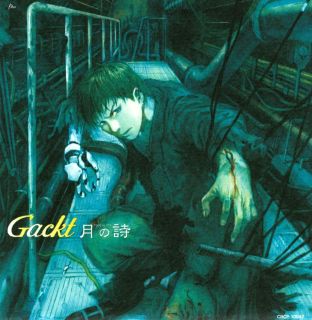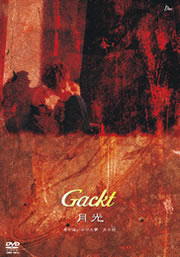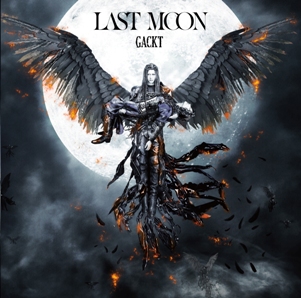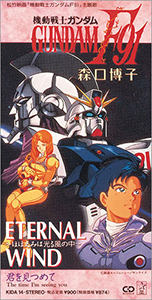
Gakuto Oshiro, better known by his mononymous stage name Gackt, is a Japanese singer-songwriter, musician, record producer and actor.

Mars is the first full-length studio album released by Japanese solo artist Gackt. It was released on April 26, 2000.

The Sixth Day: Single Collection is a compilation album released by Gackt on February 25, 2004. The album collects the artist's previous single's title songs from 1999 up to 2003, some of them having been re-recorded for this release. The Sixth Day complements The Seventh Night, an unplugged album released three months later.

The Seventh Night: Unplugged is a compilation album released by Gackt on May 26, 2004. It contains acoustic arrangements of previously released songs and complements The Sixth Day, a single collection released three months earlier. The unplugged theme of The Seventh Night would be continued by Gackt's subsequent album, Love Letter.

Moon is the third full-length studio album released by Japanese solo artist Gackt on June 19, 2002. Instead of a booklet, the concept album comes with a printed note by the artist, asking readers to "sense" the record's story, rather than analyzing the lyrics. The booklet was eventually included in the packaging of Moon's 2003 follow-up Crescent. Both albums are linked, as well as his more recent albums Diabolos and Last Moon from the "Moon Saga".

Love Letter is the fifth full-length studio album originally released by Japanese solo artist Gackt on February 14, 2005 in Japan.

Diabolos is the sixth full-length studio album released by Japanese solo artist Gackt on September 21, 2005 in Japan, and on October 26, 2007, in eighteen countries across Europe. As a concept album, it is a sequel entrant to the "Moon Saga" found in the eighth studio album Last Moon and theatre play Mysteries of Yoshitsune I&II, as well prequel to his third and fourth studio albums, Moon and Crescent, the film Moon Child, and novel Moon Child Requiem.

The discography of Japanese recording artist Gackt consists of eight studio albums, eight compilation albums, one extended play, and forty-eight singles. In 1999 Gackt signed a recording contract with Nippon Crown. His breakthrough success was the EP Mizérable, which peaked at number 2 on the Oricon albums chart. His single "Returner ", released on June 20, 2007, was his first and only single to reach the number one spot on the Oricon charts to date. In 2007, his entire back catalogue, with live song recordings from Drug Party tour, was released on the iTunes Store, video collection "The Greatest Filmography" was released in the United States and Canada, and his album Diabolos was released in 18 European countries. From November 2008 until March 2010 his records were released under his own independent label Dears, but still supported by Nippon Crown. In April 2010, Gackt transferred to Avex Group. Since February 2014 they're released by his independent record label G&Lovers, which is supported by Crown Tokuma. As a solo artist, since 2009 are reported sales of over 10 million, and holds the male soloist record for most top ten consecutive chart singles as of July 18, 2011.

"Metamorphoze" is a single released by Gackt on May 25, 2005 under Nippon Crown.

Kimi to no Distance is the Zard 11th and final studio album, released on September 7, 2005 under B-Gram Records label. The album consist theme songs used for anime television series Detective Conan. Although Sakai released singles in 2006, this was Izumi Sakai's last album before her death in 2007.

"Kimi ga Oikaketa Yume" (君が追いかけた夢) is a single released by Gackt on March 19, 2003 under Nippon Crown. It peaked at second place on the Oricon weekly chart and charted for ten weeks. It was certified gold by RIAJ.

0079–0088 is a compilation album released by Gackt on December 19, 2007. It contains eight tracks, which had either previously been used on the soundtracks of the Mobile Suit Zeta Gundam movies or were covers of earlier songs from the Gundam franchise.

"Tsuki no Uta" (月の詩) is a single released by Gackt on June 11, 2003 under Nippon Crown. It peaked at third place on the Oricon weekly chart and charted for seven weeks. The song "Tsuki no Uta" was used as the first ending theme for anime Texhnolyze. It was certified gold by RIAJ.

"Kimi ni Aitakute" (君に逢いたくて) is a single released by Gackt on October 27, 2004 under Nippon Crown. It peaked at second place on the Oricon Singles Chart and charted for seventeen weeks. In 2004, it was the 96th best selling single of the year, with sales of 98,335 copies. It ultimately sold 124,280 copies, making it Gackt's ninth best selling single. It was certified gold by RIAJ.

Gekkō is a DVD released by Japanese singer Gackt on August 6, 2003.

Re:Born is the seventh full-length studio album released by Japanese recording artist Gackt on December 2, 2009, in Japan. It is a concept album linked to its predecessor Rebirth from 2001, and besides the music disc, contains an original audio drama.
Fuyumi Sakamoto is a Japanese female enka singer under EMI Music Japan.

Are You "Fried Chickenz"?? is Japanese recording artist Gackt's fifth compilation album, released on June 23, 2010 in Japan by his former label Nippon Crown. First a solo project, it became a newly formed band named Yellow Fried Chickenz which besides Japan two times toured Europe between 2010-2011, and released a few live and studio recordings until disbandment in 2012.

Last Moon is the eighth full-length studio album by Japanese recording artist Gackt released on April 27, 2016 in Japan. As a concept album, it is considered to be the final, but not ending part of "Moon Saga", a conceptual story by which is linked to its predecessor albums Moon (2002), Crescent (2003), and Diabolos (2005), as well as the movie Moon Child (2003), theatre play Mysteries of Yoshitsune I&II (2012–2014), and two novels.

"Eternal Wind ~Hohoemi wa Hikaru Kaze no Naka~" is the ninth single by Japanese singer Hiroko Moriguchi, released on February 5, 1991, under Starchild Records. Written by Yui Nishiwaki and Yoko Orihara, the song was used as the ending theme of the 1991 mecha anime film Mobile Suit Gundam F91. The single peaked at No. 9 on Oricon's singles charts and landed at No. 47 on Oricon's 1991 year-ending chart, making it Moriguchi's best-selling single. It was also certified Gold by the RIAJ. In addition, the song led to her debut on NHK's Kōhaku Uta Gassen that year.


















